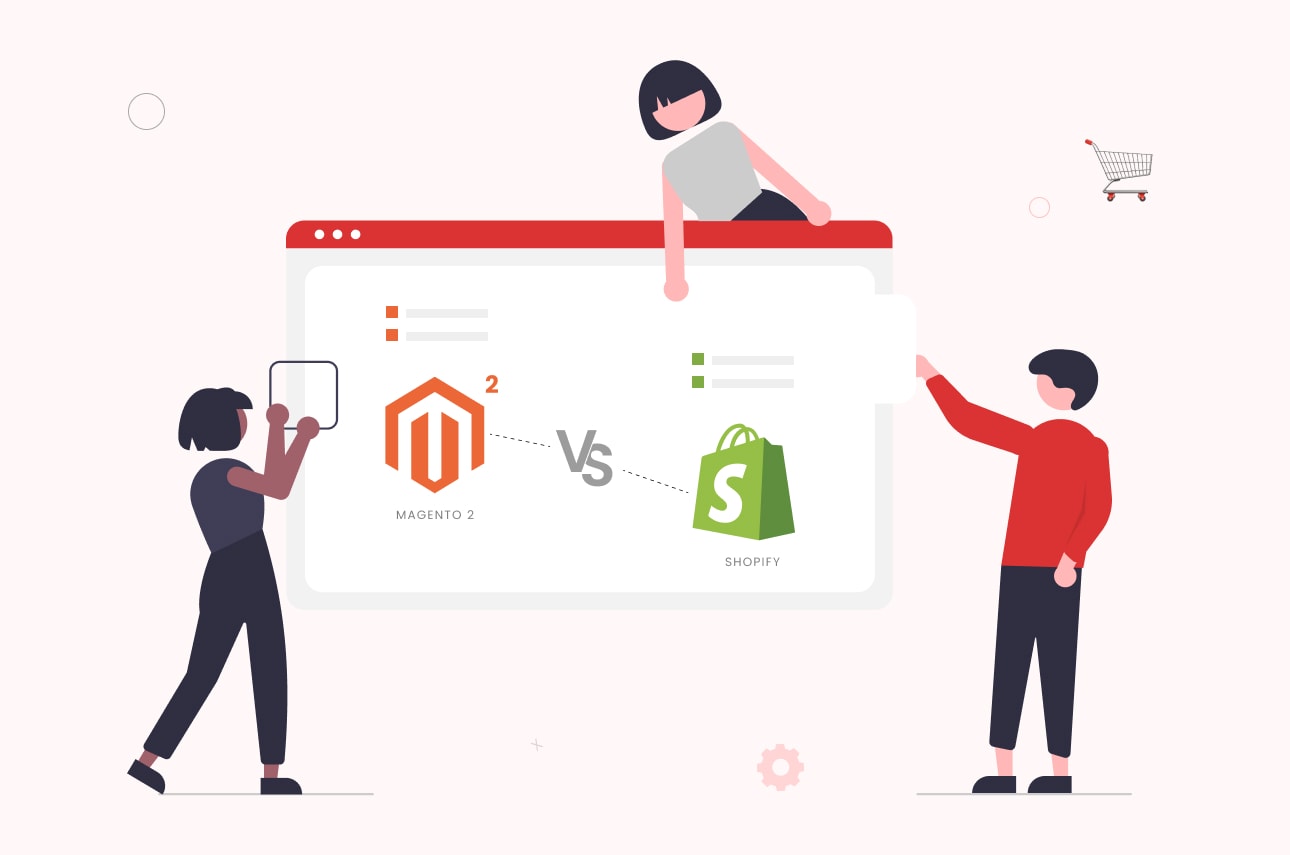Introduction
Are you a retail business owner and wish to go digital by developing a custom eCommerce app? You might be thinking of hiring the best Magento development company or a Shopify app development company in San Jose. You have got to do a bit of homework before you consult. The two most popular platforms to develop eCommerce stores are Shopify and Magento open-source. But for any non-technical retail business owner, the choice of selecting either of the two is a difficult one.
Why It is Vital to Select a Platform Beforehand?
The success of your eCommerce store depends on the foundation of building it. Normally, Startups and SMEs have budget constraints and limited resources, which makes choosing the best compatible platform. Either it could be Magento eCommerce development or Shopify development services.
But for most enterprise-grade, large-scale, or complex eCommerce web applications, Magento is greatly used by eCommerce development companies. While Shopify is more popular in the community being an all-in-one hosted platform.
So let us compare Magento and Shopify from a few standpoints to clear the vision.
Magento 2 vs Shopify Price Ranges
Magento eCommerce development offers Magento 2 open-source, meaning the code is free. However, Magento platforms have variations for enterprise-level platforms, which are Magento Enterprise Edition (EE) and Magento Enterprise Cloud Edition (ECE).
Magento EE ranges from around $22,000-$125,000 per year, whereas Magento ECE could cost from $40,000-$195,000 per year. The low end of the price range for both enterprise editions starts at $1,000,000 in sales per year or less and scales up from there. The platform charges no transaction fees but charges are applicable to third-party APIs.
Shopify is like a Software as a Service (SaaS) platform that has layered pricing depending on the functionalities. The price points include:
- Basic Shopify. Shopify’s simplest plan charges only $29 per month ($348 per year) and a processing fee of 2.9% plus $0.30 per transaction.
- Shopify. Shopify’s standard plan costs $79 per month ($948 per year) and a processing fee of 2.6% plus $0.30 per transaction.
- Advanced Shopify. Shopify’s advanced plan costs $299 per month ($3,588 per year) and a processing fee of 2.4% plus $0.30 per transaction.
- Shopify Plus. Shopify’s enterprise-level platform charges $2,000 per month ($24,000 per year) and a processing fee of 2.4% plus $0.30 per transaction.
Conclusion: Shopify is more cost-effective for Startups & SMEs.
Flexibility and Scalability
Magento development service offers not only an open-source code platform but also offers a wider range of pre-built extensions to build a custom online store faster. It is mobile-friendly, compatible with social commerce, and could also be integrated with external systems. Magento 2 offers scalability due to some extent but is pretty much expensive beyond.
Shopify app development has limitations in terms of flexibility compared to Magento, but it is more user-friendly. Customizations in Shopify development may require skilled expertise when the requirements include too many choices to be integrated. Shopify offers a design guide that offers users in the right direction that is pre-defined. So the flexibility criteria goes out of the equation. Scalability in Shopify is easier with both Standard & Advanced tiers available between the basic plan and enterprise plan.
Conclusion: Magento 2 offers more flexibility while Shopify offers more scalability.
Security
Security is the key for any digital product as it directly impacts platform reliability in eCommerce development. A lot of user data, transaction details, and assets are stored which demands optimum security.
Magento 2 has upgraded hugely from Magento 1 nullifying numerous vulnerabilities. With this fact, Magento 2 is easy to customize at the code level and when the code changes, new vulnerabilities are added to the code.
Shopify complies with PCI DSS, the gold standard for secure credit and debit card usage published by the Payment Card Industry Security Standards Council (PCI SSC). Moreover, Shopify pushes automatic security updates that foster automatic security patches to implement for every store running on Shopify.
Conclusion: Shopify edges Magento in the security area.
Features & Capabilities
Key features of Magento include:
- Reporting & Analytics
- Safe product browsing
- Customer Accounts
- Order Management
- Payment & Shipping
- Marketing & Promotional Tools
- Search Engine Optimization
Key features of Shopify Include:
- Shopify PoS
- Abandoned Cart Reminders
- Exceptional Security
- Shopify Analytics
- Advanced SEO Tools
- Store Management
Takeaways on Which One is Better and When
As we saw, Shopify is a single all-in-one solution that fits the bill for people having absolutely no technical skills and little web hosting experience. The purpose is to provide user-friendliness in publishing eCommerce websites in a faster time. For more advanced eCommerce development and technically sound users, Magento offers product depth that far outstrips Shopify, with better long-term potential. This is ultimately true in terms of pricing, performance, and even feature extendability.
Hire Shopify & Magento Developers Now!
If you have a brilliant idea and wish to develop a full-fledged platform, contact the best Shopify application development company and Magento 2 development company. Bytes Technolan offers flexible engagement models to hire certified Magento developers and Shopify developers.
With more than a decade of eCommerce experience, we provide exquisite Magento eCommerce website development at the best prices with uncompromising quality. Also, if you want to hire someone to build a Shopify store, we are the best choice. Our Shopify development services in San Jose are second to none as they deliver the fitting requirements for our customers.
Contact us to know more about the full range of our services related to custom eCommerce development leveraging Shopify and Magento 2 now.





